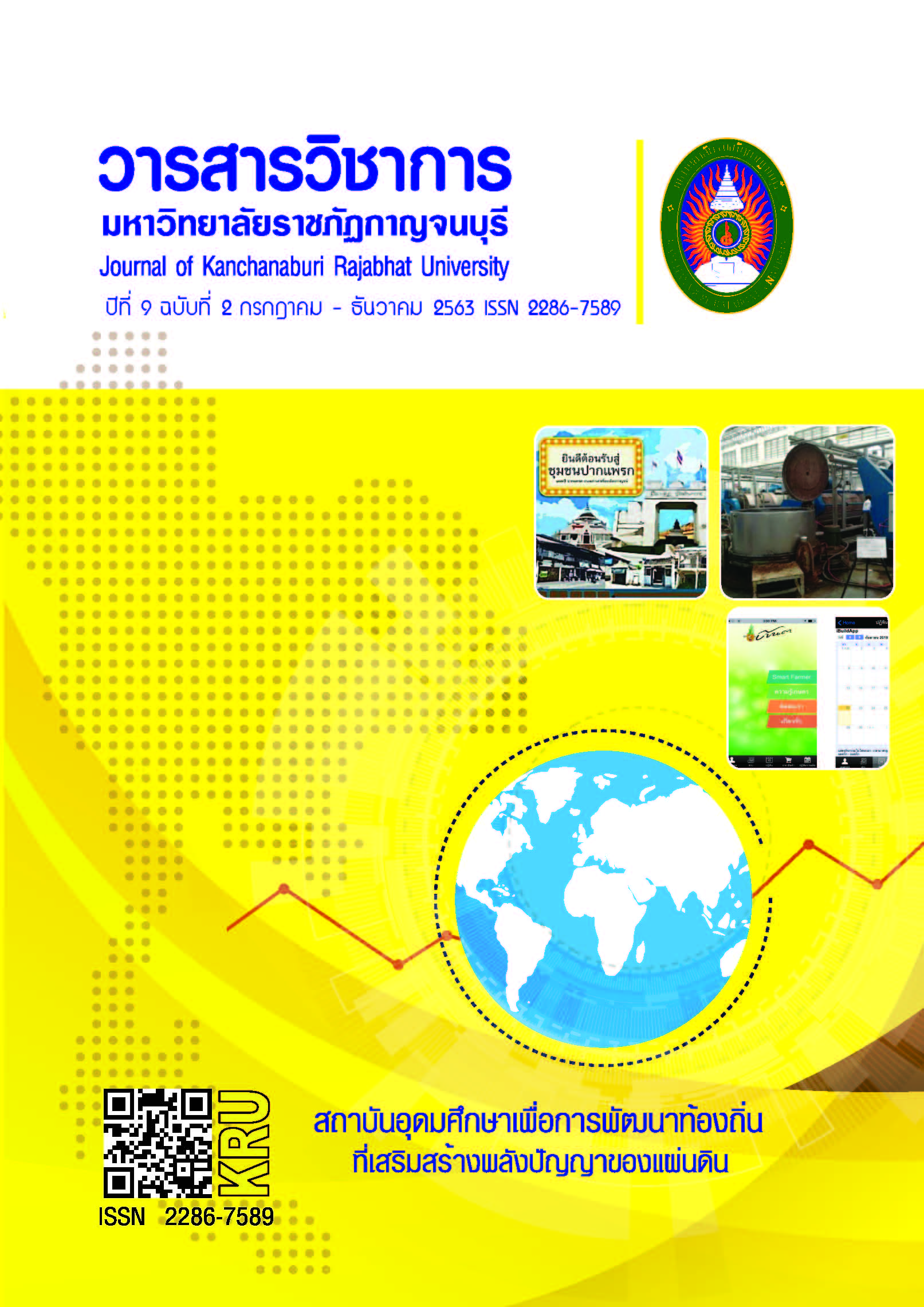FACTORS AFFECTING THE COMPETENCY OF THAI TAXATION AUDITORS
Main Article Content
Abstract
This research study aimed to study professional knowledge factors in the field of continuing professional development. The experience of working, professional skills, and basic principles of professional conduct could affect the competency of taxation auditors. The population, determined by the Taro Yamane’s formula, comprised 348 Thai taxation auditors derived from simple random sampling. The instruments used in the study was a questionnaire, and the statistics used was descriptive statistics. A multiple regression was also used to test the determined hypothesis. The results indicated that the factors of continuing professional development, professional skills, and basic principles of professional conduct positively affected Thai taxation auditors at a statistically significant level of 0.05. It was found that Thai auditors with continuing professional development performed quality inspection work and provided reliable auditing standard. They were prepared for changes in relevant accounting and financial standards and possessed professional skills. Also, Thai taxation auditors should follow the basic principles for professional conduct regarding confidentiality, transparency, independence, fairness and honesty. Auditors with these qualifications could enhance their performance quality leading to their professional success.
Article Details
References
กรมพัฒนาธุรกิจการค้า. (2563). กฎกระทรวงว่าด้วยการยกเว้นไม่ต้องจัดให้งบการเงินได้รับรองการตรวจสอบและแสดงความเห็นโดยผู้บัญชีรับอนุญาต พ.ศ.2544. ค้นเมื่อ มกราคม 19, 2563, จาก http://www.dbd.go.th.
กรมสรรพากร. (2563). ความรู้เกี่ยวกับผู้สอบบัญชีภาษีอากร. ค้นเมื่อ มกราคม 17, 2563,
จาก https://www.rd.go.th/publish /25624.0.
_______. (2563). รายชื่อผู้ตรวจสอบและรับรองบัญชี. ค้นเมื่อ มกราคม 17, 2563, จาก https://www.rd.go.th /publish/7244.0.
กมลพร วรรณชาติ ภัทรดา พุทธสวัสดิ์ และมัทนชัย สุทธันธุ์. (2561). ประสิทธิภาพการดำเนินงานหลักสูตรอาชีวศึกษาระบบทวิภาคี ความพร้อมด้านทักษะวิชาชีพตามมาตรฐานการศึกษาระหว่างประเทศสำหรับผู้ประกอบวิชาชีพบัญชี (IES3) ของนักศึกษาระดับประกาศนียบัตรวิชาชีพชั้นสูง สาขางานการบัญชี. วารสารมหาวิทยาลัยนราธิวาสราชนครินทร์ สาขามนุษยศาสตร์และสังคมศาสตร์, 5(2), 196-206.
ฉัตรรัชดา วิโรจน์รัตน์. (2561). โมเดลความสัมพันธ์เชิงสาเหตุของการประยุกต์ใช้นวัตกรรมและเทคโนโลยีปฏิบัติงานบัญชีสมัยใหม่, การพัฒนาความรู้ต่อเนื่องทางวิชาชีพบัญชี, ความเชี่ยวชาญทางการบัญชีอย่างมืออาชีพ ที่มีต่อประสิทธิภาพรายงานทางการเงินของนักบัญชีในประเทศไทย. วารสารวิทยาการจัดการสมัยใหม่, 11(1), 17-34.
ณัฏฐยา ปัญญาไชยวิชญ์ และสมใจ บุญหมื่นไวย. (2560). ความสัมพันธ์ระหว่างทักษะทางวิชาชีพของผู้สอบบัญชีสหกรณ์ต่อความรับผิดชอบทางการสอบบัญชี. วารสาร มทร.อีสาน, 4(2), 30-45.
ดุจกมล นาจารย์ อัครเดช ฉวีรักษ์ และศุภรักษ์ จันทร์จรัสจิตต์. (2558). ผลกระทบของการเรียนรู้ในวิชาชีพอย่างต่อเนื่องที่มีต่อคุณภาพการปฏิบัติงานการสอบบัญชีของผู้สอบบัญชีรับอนุญาตในประเทศไทย. วารสารมนุษยศาสตร์และสังคมศาสตร์ มหาวิทยาลัยมหาสารคาม, 34(3), 116-125.
นฤนาถ ศราภัยวานิช มนทิพย์ ตั้งเอกจิต สุวรรณา เลาหะวิสุทธิ์ และดุรยา สุขถมยา. (2561). ความรู้ความเข้าใจของผู้ประกอบวิชาชีพบัญชีเกี่ยวกับมาตรฐานการรายงานทางการเงินสำหรับกิจการที่ไม่มีส่วนได้เสียสาธารณะ. วารสารบริหารธุรกิจศรีนครินทรวิโรฒ, 9(1), 137-152.
นวพร ขู้เปี้ยเต้ง และฐิตาภรณ์ สินจรูญศักดิ์. (2559). ปัจจัยเชิงสาเหตุของทักษะและจรรยาบรรณในการปฏิบัติงาน ที่มีต่อคุณภาพของรายงานการตรวจสอบและรับรองบัญชีของผู้สอบบัญชีภาษีอากรแห่งประเทศไทย. วารสารบริหารธุรกิจเทคโนโลยีมหานคร, 13(2), 100-116.
สภาวิชาชีพบัญชีในพระบรมราชูปถัมภ์.2563. พระราชบัญญัติวิชาชีพบัญชี พ.ศ. 2547 “International Education Standards (IES)”. ค้นเมื่อ มกราคม 27, 2563 จาก http://www.fap.or.th.
Hannimitkulchai, K., & Ussahawanitchakit, P. (2016). Continuous audit development and audit survival: Evidence from tax auditors in Thailand. The Business and Management Review, 7(5), 487-498.
Kang, Y. J., Trotman, A. J. & Trotman, K. T. (2015). The effect of an Audit Judgment Rule on audit committee members’ professional skepticism: The case of accounting estimates. Accounting Organizations and Society, 46, 59-76.
Field, A. (2000). Discovering statistic using SPSS for windows. London: Sage.
Likert, R. (1932). A technique for the measurement of attitudes. Archives of Psychology. 22(140), 55.
Wangcharoendate, S. (2015). Audit professional learning and the antecedents and consequences: an empirical study of tax auditor in Thailand. The Business and Management Review, 7(1), 143-156.
Wittayapoom, K. & Limanonthachai, T. (2016). Audit knowledge management strategies and audit job performance: A study of tax auditors in Thailand. The Business and Management Review, 7(5), 430-437.
Salameh, R., Weshah, G., Nsour, M. & Hiyari, A. (2011). Alternative internal audit structures and perceived effectiveness of internal audit in fraud prevention: Evidence from Jordanian banking industry. Canadian Social Science, 7(3), 40–50.
Yamane, T. (1973). Statistics: An Introductory Analysis (3rd ed). USA: Harper & Row.


